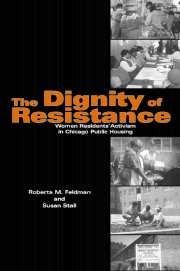Book contents
- Frontmatter
- Contents
- Foreword by Sheila Radford-Hill
- Preface and Acknowledgments
- PART I INTRODUCTION
- PART II WENTWORTH GARDENS' HISTORIC CONTEXT
- 2 U.S. Public Housing Policies: Wentworth Gardens' Historic Backdrop
- 3 Memory of a Better Past, Reality of the Present: The Impetus for Resident Activism
- PART III EVERYDAY RESISTANCE IN THE EXPANDED PRIVATE SPHERE
- PART IV TRANSGRESSIVE RESISTANCE IN THE PUBLIC SPHERE
- PART V CONCLUSIONS
- Epilogue
- Appendix A Timeline of Wentworth Gardens Resident Activists' Key Initiatives
- Appendix B A Demographic Profile of the Resident Community Activists Interviewed, 1992–1998
- References
- Index
3 - Memory of a Better Past, Reality of the Present: The Impetus for Resident Activism
Published online by Cambridge University Press: 06 July 2010
- Frontmatter
- Contents
- Foreword by Sheila Radford-Hill
- Preface and Acknowledgments
- PART I INTRODUCTION
- PART II WENTWORTH GARDENS' HISTORIC CONTEXT
- 2 U.S. Public Housing Policies: Wentworth Gardens' Historic Backdrop
- 3 Memory of a Better Past, Reality of the Present: The Impetus for Resident Activism
- PART III EVERYDAY RESISTANCE IN THE EXPANDED PRIVATE SPHERE
- PART IV TRANSGRESSIVE RESISTANCE IN THE PUBLIC SPHERE
- PART V CONCLUSIONS
- Epilogue
- Appendix A Timeline of Wentworth Gardens Resident Activists' Key Initiatives
- Appendix B A Demographic Profile of the Resident Community Activists Interviewed, 1992–1998
- References
- Index
Summary
We're not fighting for the status quo to keep these raggedy buildings…. We're fighting to be able to stay in the community…. We've stayed there during the hard times. Now we're going to up and move now that they're going to redevelop it? That's insanity.
Wardell Yotaghan, a longtime resident of Rockwell Gardens CHA family development and cofounder of the Coalition to Protect Public Housing, Chicago Tribune, (McRoberts, June 20, 1997, p. 5A)On June 19, 1997, “Juneteenth Day,” over 1,000 public housing residents, including several Wentworth Gardens activists, and their supporters converged on downtown Chicago for a march and a rally to protest HUD and local policies that threaten the very existence of public housing.
WE SHALL NOT BE TAKEN FOR GRANTED ANYMORE WE SHALL NOT BE MOVED
(Flyer announcing “The People's March” to Protest Public Housing Policies, The Coalition to Protect Public Housing, Chicago, June 19, 1997)
Sponsored by the Coalition to Protect Public Housing, the event drew attention to the failure of government plans to improve the living conditions for Chicago public housing residents, as well as current policies to remove these very low-income residents from their homes. Instead, the coalition called for a “Public Housing Contract” to give “guarantees to residents including the choice to remain in their redeveloped community and accountability that clearly states tenant and management responsibilities” (Coalition to Protect Public Housing brochure).
- Type
- Chapter
- Information
- The Dignity of ResistanceWomen Residents' Activism in Chicago Public Housing, pp. 59 - 88Publisher: Cambridge University PressPrint publication year: 2004



